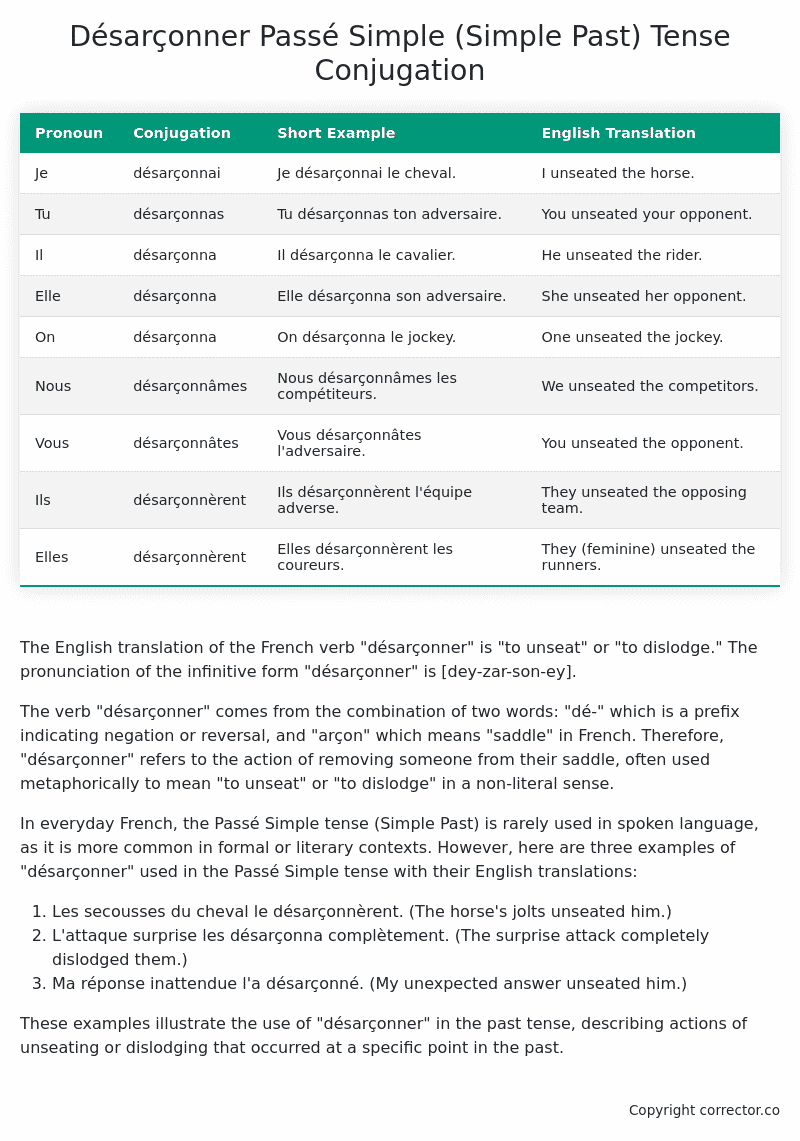Passé Simple (Simple Past) Tense Conjugation of the French Verb désarçonner
Introduction to the verb désarçonner
The English translation of the French verb “désarçonner” is “to unseat” or “to dislodge.” The pronunciation of the infinitive form “désarçonner” is [dey-zar-son-ey].
The verb “désarçonner” comes from the combination of two words: “dé-” which is a prefix indicating negation or reversal, and “arçon” which means “saddle” in French. Therefore, “désarçonner” refers to the action of removing someone from their saddle, often used metaphorically to mean “to unseat” or “to dislodge” in a non-literal sense.
In everyday French, the Passé Simple tense (Simple Past) is rarely used in spoken language, as it is more common in formal or literary contexts. However, here are three examples of “désarçonner” used in the Passé Simple tense with their English translations:
- Les secousses du cheval le désarçonnèrent. (The horse’s jolts unseated him.)
- L’attaque surprise les désarçonna complètement. (The surprise attack completely dislodged them.)
- Ma réponse inattendue l’a désarçonné. (My unexpected answer unseated him.)
These examples illustrate the use of “désarçonner” in the past tense, describing actions of unseating or dislodging that occurred at a specific point in the past.
Table of the Passé Simple (Simple Past) Tense Conjugation of désarçonner
| Pronoun | Conjugation | Short Example | English Translation |
|---|---|---|---|
| Je | désarçonnai | Je désarçonnai le cheval. | I unseated the horse. |
| Tu | désarçonnas | Tu désarçonnas ton adversaire. | You unseated your opponent. |
| Il | désarçonna | Il désarçonna le cavalier. | He unseated the rider. |
| Elle | désarçonna | Elle désarçonna son adversaire. | She unseated her opponent. |
| On | désarçonna | On désarçonna le jockey. | One unseated the jockey. |
| Nous | désarçonnâmes | Nous désarçonnâmes les compétiteurs. | We unseated the competitors. |
| Vous | désarçonnâtes | Vous désarçonnâtes l’adversaire. | You unseated the opponent. |
| Ils | désarçonnèrent | Ils désarçonnèrent l’équipe adverse. | They unseated the opposing team. |
| Elles | désarçonnèrent | Elles désarçonnèrent les coureurs. | They (feminine) unseated the runners. |
Other Conjugations for Désarçonner.
Le Present (Present Tense) Conjugation of the French Verb désarçonner
Imparfait (Imperfect) Tense Conjugation of the French Verb désarçonner
Passé Simple (Simple Past) Tense Conjugation of the French Verb désarçonner (You’re reading it right now!)
Passé Composé (Present Perfect) Tense Conjugation of the French Verb désarçonner
Futur Simple (Simple Future) Tense Conjugation of the French Verb désarçonner
Futur Proche (Near Future) Tense Conjugation of the French Verb désarçonner
Plus-que-parfait (Pluperfect) Tense Conjugation of the French Verb désarçonner
Passé Antérieur (Past Anterior) Tense Conjugation of the French Verb désarçonner
Futur Antérieur (Future Anterior) Tense Conjugation of the French Verb désarçonner
Subjonctif Présent (Subjunctive Present) Tense Conjugation of the French Verb désarçonner
Subjonctif Passé (Subjunctive Past) Tense Conjugation of the French Verb désarçonner
Subjonctif Imparfait (Subjunctive Imperfect) Tense Conjugation of the French Verb désarçonner
Conditionnel Présent (Conditional Present) Tense Conjugation of the French Verb désarçonner
Conditionnel Passé (Conditional Past) Tense Conjugation of the French Verb désarçonner
Conditionnel Passé II (Conditional Past II) Tense Conjugation of the French Verb désarçonner
L’impératif Présent (Imperative Present) Tense Conjugation of the French Verb désarçonner
L’impératif Passé (Imperative Past) Tense Conjugation of the French Verb désarçonner
L’infinitif Présent (Infinitive Present) Tense Conjugation of the French Verb désarçonner
L’infinitif Passé (Infinitive Past) Tense Conjugation of the French Verb désarçonner
Le Participe Présent (Present Participle) Tense Conjugation of the French Verb désarçonner
Le Participe Passé (Past Participle) Tense Conjugation of the French Verb désarçonner
Struggling with French verbs or the language in general? Why not use our free French Grammar Checker – no registration required!
Get a FREE Download Study Sheet of this Conjugation 🔥
Simply right click the image below, click “save image” and get your free reference for the désarçonner Passé Simple tense conjugation!

Désarçonner – About the French Passé Simple (Simple Past) Tense
Formation
Usage
Narration
Historical Context
Interactions with other tenses
Passé Composé
Imparfait
Conditional and Subjunctive
Summary
I hope you enjoyed this article on the verb désarçonner. Still in a learning mood? Check out another TOTALLY random French verb conjugation!


